Each listen to Ribbon Skirt completely enthralled me more. Formerly known as Love Language, the Montreal rock band is profoundly conscious, which shows in their impassioned musicianship. Made up of Anishinaabe singer Tashiina Buswa and guitarist Billy Riley, the band’s name change and the release of their debut album, BITE DOWN, led to a more expansive and ruminative set of songs.
Produced by their friends Scott “Monty” Munro of Preoccupations and his partner Marlaena Moore, the core of BITE DOWN is not only living with grief and troubling memories, but a celebration of Buswa’s Indigenous identity and cultural practices. However, Buswa hesitates to label the record solely as “Indigenous music.” While BITE DOWN does draw from her unique life experience as an Indigenous artist, writing from such a perspective proves there’s room for other Indigenous and BIPOC artists to have their voices told in indie rock scenes, who often aren’t at the forefront at all. Therefore, the triumphant guitar catharsis has two meanings—fearlessly letting out years of pent-up introspection, and Indigenous voices proudly being told in this medium.
I spoke to Buswa at length about how BITE DOWN came together, the messages and themes behind the songs, and how exactly the name change from Love Language changed the band’s trajectory toward a more transformative artistic direction.
How did the album first come together? What was the genesis for its musical content and themes?
Tashiina Buswa: It’s been a long time in the making. We’ve been doing this for the past four years or so. Then we made a friend with Scott Munro, who’s in the band Preoccupations. He became one of our friends, along with Marlaena Moore, his partner who’s also a musician. They offered to help record and produce our record for us, and we were like, “Yes, please!” We started working with them, got a couple grants, and did it over one year.
As far as thematic stuff goes, it’s all drawn from my life and experiences as an Indigenous person, especially, growing up in Northern Canada. There’s a lot of themes in the record that relate to my experience growing up in a colonial world as an Indigenous person. I grew up in the church, so there was a lot of weird religious stuff and I sort of grew up being told that my cultural practices were “evil” and something bad. A lot of it has to do with Canadian policy that goes back to the Sixties Scoop and residential schools. [BITE DOWN] is about grieving that loss, but also celebrating the regaining of what has been lost. It works in dualities, because as an adult now, I feel like I’m embracing and discovering all that and learning it now.
I think I have a hard time like… I never want to be playing the victim, that’s a big thing for me. At the same time, it is something really heavy that happened. There’s no skirting around that. I do think there is a way forward, which is what I feel like a lot of young Indigenous folks are doing now, trying to find that path through the darkness.
Am I right in saying the record sounds “cathartic,” “triumphant,” and “urgent”? Those are the words that came to my head when listening to it. Was it a conscious choice or did it come like that just as you were writing?
TB: I think it’s cool that’s something you’ve picked up on, because I think “urgency” characterises our music and we try to… I don’t know, contain some sort of energy and unleash it at the same time. *laughs* That comes naturally when we’re writing the actual music. That’s how we’ve always been for some reason. I’d say we’re a louder band, but it’s all about trying to find that right level of restraint, which we’re starting to find lately.
What’s the restraint from?
TB: I mean, I don’t know, we used to be louder. I feel I used to be louder. But then something about that wasn’t sitting with me. I think it’s the evolution of any band trying to find their sound and what feels true to them. Like, yeah, I could do a bunch of yelling and screaming—and I do, sometimes—but I think there’s something to be said about… I don’t know, I’m trying to be more “articulate” lately, even in energy flow. Still a work in progress, I guess. *laughs*
That’s fair enough. I was looking at the press release and reading up on the Anishinaabe, with that as your identity and the cultural practices that inform the record. Do you feel, working as an Indigenous artist, there’s a compulsion to embed messages in your art while trying not to be performative?
TB: I know what you mean. I think I struggled with that idea in the past as well. It’s been a major theme in my life, particularly in the past five years rediscovering and reconnecting to that side of myself. I think it comes out inherently no matter what. I also, at the same time, really do believe we need to make way for more BIPOC and Indigenous artists. Especially in this scene, which is often, you know, led by white men. I really do strongly believe that I should try to take up some space. It’s about keeping both of those things in mind.
It’s essentially inherent to the music I naturally write and what I’m inclined to write about—it does seep through in a lot of different ways I wouldn’t say are compulsive or unconscious. But at the same time, I’m a human; I’m just a person in the world and writing about living in this world. That’s why I hesitate to call it “Indigenous music,” because I don’t like labels like that either, but it’s part of it naturally.
As of our chat, the latest single is “Wrong Planet.” Why’d you choose that song as the next teaser for BITE DOWN?
TB: Before we released the record, we sent it to a bunch of our friends and were like, “Hey, which ones do you think are the singles?” *laughs* That was one of the ones that stuck out to people, that was a large reason. I also think it’s cool, because it’s not the first single—“Cellophane” technically was because it’s already out—but it’s the first single in this rollout. In that sense, it’s cool that it’s such an explosive… “Okay, we’re here!” *laughs* I’d say the next single is more subdued, at least the beginning of it. So that’s pretty much why we chose it. The album deals with dualities and two different perspectives at any given time. I think that song encapsulates that feeling the best. It’s like a thesis of the chaos and confusion of the whole album.
I can definitely hear it. When I read some of the words: “It’s getting harder not to feel so abandoned / I’ve tried to understand it / We’re at the ending but it’s not how you planned it,” it’s profound! Those lines really stuck out.
TB: Thank you! That’s good to hear.
I know the songs are drawn from your experiences, but more broadly, is there a story on BITE DOWN? On the last track, “Earth Eater,” there’s a mantra, “Bite down / Earth eater,” repeated at the end as a callback to the album title. It’s like everything has fallen into place.
TB: That’s such a good question. There’s definitely not a linear story told. The way I write is very fragmented and kind of nonsensical. *laughs* I wouldn’t call myself a “singer-songwriter” where there’s a beginning, middle, and end. It’s all scraps of my experiences all in one melting pot. That being said, the first track, “Dead Horse,” starts with this anxiety-driven cover being cast. Then, all the songs in-between are the cycles of different emotions in that particular journey. “Earth Eater” would be the conclusion—I’m kind of thinking at the same time as I’m talking about this—but that conclusion, “Bite down / Earth eater,” is maybe me telling that to myself. *laughs* To say, you should devour all these experiences you’ve had and take them for the next ride, which who knows what that is.
Even that whole song, there’s little snippets of lyrics that are dreams and recurring nightmares I’ve had, and experiences I’ve had, like car crashes. These are very visceral memory points, so to summarize them in one song, that’s how they’d sound. To take all that and gulp it down at the end, I guess. Just a reminder that you are part of the Earth, obviously. But in my culture, the way I grew up, my mom always talked about our relations living and nonliving, and everything around you is your relation, and you have a relationship with every single thing you see: Like in this room, on this table, outside on that tree, there’s snow out there. I think that’s a feeling I was trying to tap into with that song particularly, as a clincher for the record. Like, you’re of everything. You belong to the world; the world doesn’t belong to you. That’s how I was always taught, you’re a part of that.
I really like “Mountains,” it’s such a great, cathartic rock track. It just soars. I’d love to hear more about that one, but are there also any standout tracks that jump out to you for whatever reason?
TB: I think “Mountains” is a great track as well. It’s funny because most of the people we sent the record to, every single one of them said “Mountains” was a standout, so that’s really good to hear it landed that way. I really like “Mountains” and “Cut,” especially, because those were the first two songs where for the first time, I wrote something where I was really staring at the face of something. Like, I feel like I always try to obscure things and I don’t know what certain songs mean, but I know exactly what those songs mean to me. I know exactly what I was saying to myself or other people. That’s a cool place to be in, because I don’t usually write with that clarity. I’m kind of nervous about releasing “Mountains,” because it’s like my diary! *laughs* It’s fine, it’s fine… But even sonically, that song is fun to play live too. I love how loud it gets with that wall of guitars.
*laughs* Sweet as. I also read the band used to perform as Love Language, and then the name change to Ribbon Skirt happened. Beyond the name change, what else changed?
TB: Once we changed the name, the whole project changed, it was almost like a new project altogether. Our bass player in Love Language left the band and we had to replace them, and it signalled a new shift anyway. I think back in Love Language, it was a lot more lighthearted and more of a funny band in a way. When you’re dealing with subject matters like this, you have to have a level of responsibility.
Even when we changed the name, I asked my mom about it. A ribbon skirt is a traditional skirt that Indigenous people wear in North America, and the ribbons on it signify lots of different things. I asked my mom what her opinion was, and she said, “Well, you have to carry that name with responsibility if you choose that to be your name.” That really stuck with me. I would never want to do anything to sway that.
I think the music got a lot more solemn. *laughs* But we’re still people, too. We have a really fun live show, we run around the stage and into the crowd. There’s ways of doing it. I have a friend from OMBIIGIZI, they’re an Indigenous band in Ontario. Once in a conversation, they said, “We can’t just be up on stage talking about taking bong hits or something.” *laughs* You can’t do that, you know what I mean? You can’t be goofing off like that. There’s a certain level of responsibility that it takes. I think that shifted sonic aspects of it, which is okay, because I like the sound of the music to be this way.
I feel like a lot of people don’t take things very seriously in this day and age. *laughs* Especially online. I feel like for people everything always has to be a joke and I think I was falling into that at one point, especially with the old band and like, you know what, some things you can… It’s fine to not make a joke out of everything, but you can still be a fun person and have a good time.
What do you hope people will take away from BITE DOWN?
TB: I hope people can see there’s room for Indigenous voices in the music scene, especially in the alt scene. I hope people can appreciate that these stories can be told in such a way, through this vehicle of rock music. For me with art, I always just hope people can take anything from it and that’s what they derive from it. If it leaves any impression or feeling—like it’s been interesting talking to you and hearing what songs made an impression on you or what lines stood out to you—then just bite into life, swallow it down and revel in that feeling. Even if it’s hard, scary, or anxious feelings. Because that’s all a part of it. Everything renews, there’s always a new cycle.
BITE DOWN is out now on Bandcamp. You can follow Ribbon Skirt for updates over on Instagram!


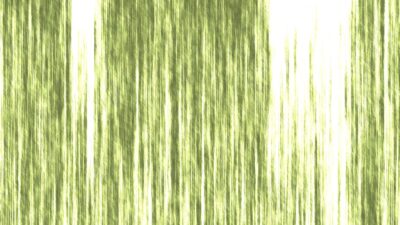
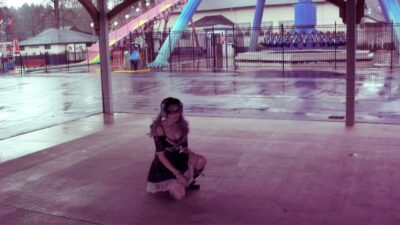

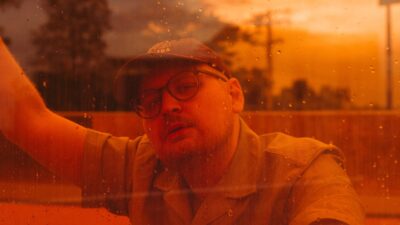
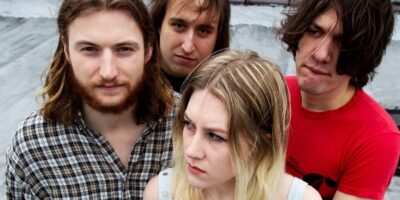

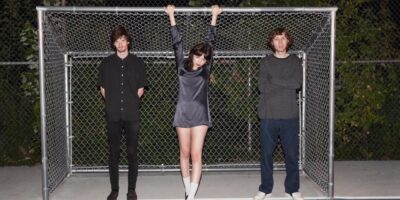

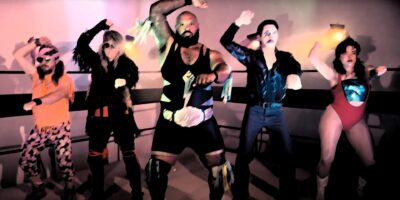





Comments